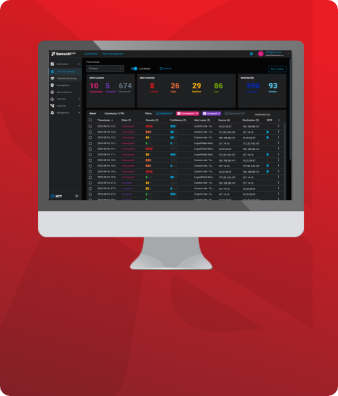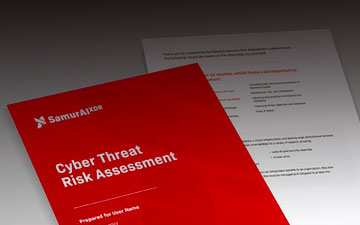It's clearer than ever that cybersecurity is a top priority in 2022. Securing your networks and devices is essential to keep your business protected and safeguard your assets against the growing risk of digital attacks and fraud.
Cybersecurity is far from a stagnant concept, though. The sector is constantly receiving innovations in order to keep up with new and evolving threats. And one of the key innovations in recent years is AI cybersecurity.
In this article, we're going to look at the impact that AI is having on cybersecurity and what you need to know about that impact.
1. The use of AI in cybersecurity is increasing
First, it's important to know that the use of AI in cybersecurity is increasing every day. More and more businesses are taking advantage of this technology and innovators are continuously coming up with new solutions.
According to Statista, 75% of businesses relied on AI-based cybersecurity platforms in 2019 — a number that’s likely only increased as the technology has become more commonplace. An additional 71% are using AI for data security and 68% for endpoint security.
In short, AI isn't going anywhere. It's crucial to the future of cybersecurity and businesses are already embracing it en masse. To stay ahead of threats as well as to keep up with the competition, businesses will need to stay invested in AI cybersecurity.
This also means that businesses that are already using AI may want to consider new avenues for utilizing this technology. AI isn't a one-time upgrade, but an ongoing implementation process.
2. A proactive approach is essential — and AI makes that possible
If there's one thing we've learned about cybersecurity, it's that a reactive approach no longer works. Too many threats, from ransomware to social engineering, rely on businesses being slow to respond to threats.
That means that a reactive approach is really a just-too-late approach. By the time your business is responding to the threat, it's already done its work and damaged your network, devices, and/or assets, and/or reputation.
AI cybersecurity helps put you back in the driver's seat. It moves you from a reactive to a proactive state, allowing you to instantly catch threats, respond to them automatically, and cut them down no matter how invisible they may be.
This is largely thanks to AI's ability to monitor a vast number of endpoints and data simultaneously. And again, it isn't just the cybersecurity experts who believe AI is crucial here. 69% of enterprises believe that AI is key to the future of their cybersecurity strategy.
3. AI can help improve your business’s cyber immunity
Building on the point above, a useful way of thinking about AI cybersecurity is as an immune system. The human immune system doesn't wait for you to notice that something is wrong. It notices when something is wrong instantly and starts addressing the threat right away.
In the future, as AI fully saturates our cybersecurity systems, it's our goal to eventually reach this level of immunity. You won't just have an AI to alert your cybersecurity team that something is wrong. It'll detect, mitigate, remove, and repair the threat as soon as it hits your network.
Ideally, this will make it exceptionally difficult for human-engineered malware to penetrate your systems and do any serious damage. And if there's one thing we're sure of, it's that this kind of response system is only possible with AI.
A human IT team, while still a necessity, can't keep up with AI-powered cybersecurity solutions.
4. AI is a force multiplier
Another useful thing to know about AI is that it acts as a force multiplier in cybersecurity. That means it is useful in taking existing cybersecurity measures and making them more effective across the board.
An excellent example of this is when researchers from Virginia Tech and Deloitte discovered a way to block jamming attacks against 5G networks, a type of attack that 5G is particularly susceptible to.
What the researchers found was that implementing AI cybersecurity into their defense model allowed it to respond to jamming attacks in real-time. The system was able to detect a threat and instantly start running interference effectively. They turned one of 5G's greatest weaknesses into a cybersecurity strength, and they did so with AI and machine learning technology.
This is a great example of how AI won't just be a feature of cybersecurity moving forward, but in many ways the backbone of security.
5. It’s not as expensive as you might think
The last thing you need to know about AI cybersecurity is that it's probably not as expensive as you think. Many security providers are working to bring the cost down, offering a solution that is viable, effective, and affordable for businesses of varying sizes and cybersecurity-savviness.
In fact, this is something that the team here at Samurai XDR is particularly passionate about. Our XDR solution utilizes AI without charging our users hefty fees.
If you're looking for an AI cybersecurity solution, reach out to our team of experts today. We can help you protect your network with a cutting-edge, AI-backed solution.
Featured articles
Identity Management in the Physical and Digital Worlds
7 August 2024 | Webinars
In today's rapidly evolving world, managing identities securely and efficiently is more crucial than ever. Join us for an insightful...
Identity Management in the Physical and Digital Worlds
30 July 2024 | Webinars
In today's rapidly evolving world, managing identities securely and efficiently is more crucial than ever. Join us for an insightful...
XDR for Small and Medium Businesses: Is It Worth It?
24 July 2024 | XDR
Cybersecurity is of paramount importance to virtually all organizations and SMBs have to address several specific challenges. The failure to...





